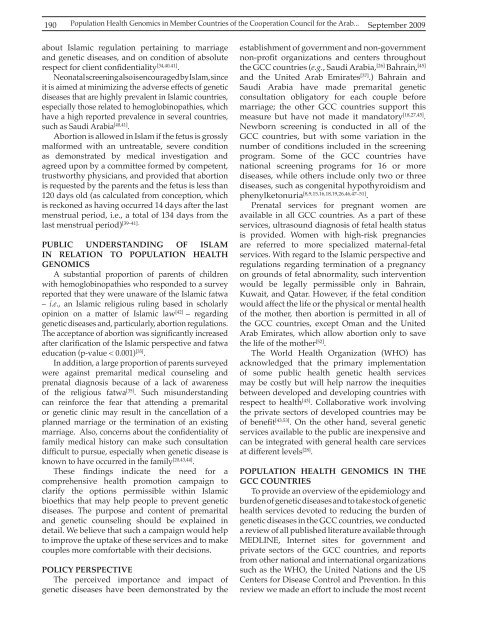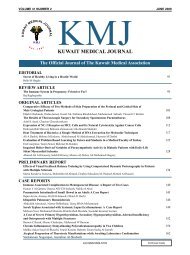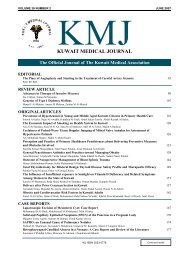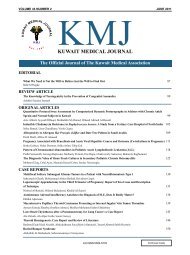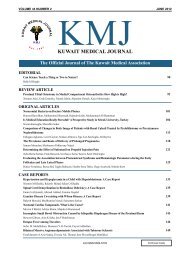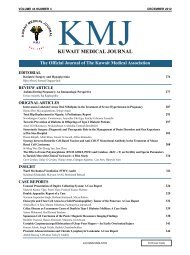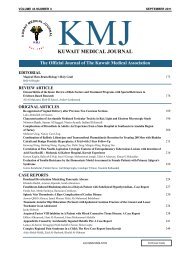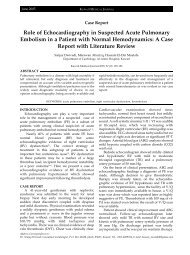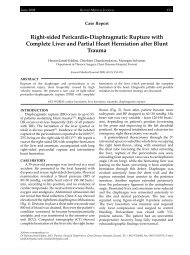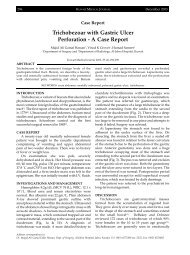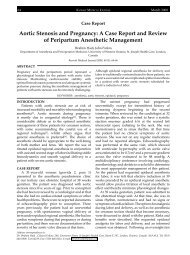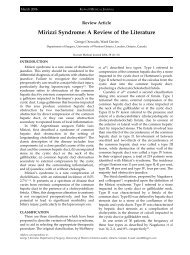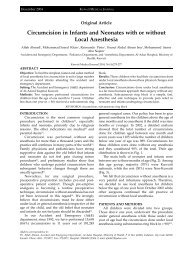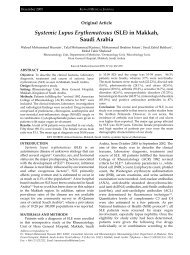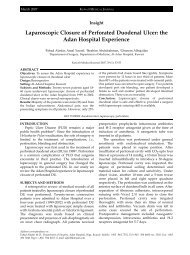Vol 41 # 3 September 2009 - Kma.org.kw
Vol 41 # 3 September 2009 - Kma.org.kw
Vol 41 # 3 September 2009 - Kma.org.kw
Create successful ePaper yourself
Turn your PDF publications into a flip-book with our unique Google optimized e-Paper software.
190<br />
Population Health Genomics in Member Countries of the Cooperation Council for the Arab...<br />
<strong>September</strong> <strong>2009</strong><br />
about Islamic regulation pertaining to marriage<br />
and genetic diseases, and on condition of absolute<br />
respect for client confidentiality [34,40,<strong>41</strong>] .<br />
Neonatal screening also is encouraged by Islam, since<br />
it is aimed at minimizing the adverse effects of genetic<br />
diseases that are highly prevalent in Islamic countries,<br />
especially those related to hemoglobinopathies, which<br />
have a high reported prevalence in several countries,<br />
such as Saudi Arabia [40,<strong>41</strong>] .<br />
Abortion is allowed in Islam if the fetus is grossly<br />
malformed with an untreatable, severe condition<br />
as demonstrated by medical investigation and<br />
agreed upon by a committee formed by competent,<br />
trustworthy physicians, and provided that abortion<br />
is requested by the parents and the fetus is less than<br />
120 days old (as calculated from conception, which<br />
is reckoned as having occurred 14 days after the last<br />
menstrual period, i.e., a total of 134 days from the<br />
last menstrual period) [39–<strong>41</strong>].<br />
PUBLIC UNDERSTANDING OF ISLAM<br />
IN RELATION TO POPULATION HEALTH<br />
GENOMICS<br />
A substantial proportion of parents of children<br />
with hemoglobinopathies who responded to a survey<br />
reported that they were unaware of the Islamic fatwa<br />
– i.e., an Islamic religious ruling based in scholarly<br />
opinion on a matter of Islamic law [42] – regarding<br />
genetic diseases and, particularly, abortion regulations.<br />
The acceptance of abortion was significantly increased<br />
after clarification of the Islamic perspective and fatwa<br />
education (p-value < 0.001) [35] .<br />
In addition, a large proportion of parents surveyed<br />
were against premarital medical counseling and<br />
prenatal diagnosis because of a lack of awareness<br />
of the religious fatwa [35] . Such misunderstanding<br />
can reinforce the fear that attending a premarital<br />
or genetic clinic may result in the cancellation of a<br />
planned marriage or the termination of an existing<br />
marriage. Also, concerns about the confidentiality of<br />
family medical history can make such consultation<br />
difficult to pursue, especially when genetic disease is<br />
known to have occurred in the family [20,43,44] .<br />
These findings indicate the need for a<br />
comprehensive health promotion campaign to<br />
clarify the options permissible within Islamic<br />
bioethics that may help people to prevent genetic<br />
diseases. The purpose and content of premarital<br />
and genetic counseling should be explained in<br />
detail. We believe that such a campaign would help<br />
to improve the uptake of these services and to make<br />
couples more comfortable with their decisions.<br />
POLICY PERSPECTIVE<br />
The perceived importance and impact of<br />
genetic diseases have been demonstrated by the<br />
establishment of government and non-government<br />
non-profit <strong>org</strong>anizations and centers throughout<br />
the GCC countries (e.g., Saudi Arabia, [26] Bahrain, [45]<br />
and the United Arab Emirates [37] .) Bahrain and<br />
Saudi Arabia have made premarital genetic<br />
consultation obligatory for each couple before<br />
marriage; the other GCC countries support this<br />
measure but have not made it mandatory [18,27,45] .<br />
Newborn screening is conducted in all of the<br />
GCC countries, but with some variation in the<br />
number of conditions included in the screening<br />
program. Some of the GCC countries have<br />
national screening programs for 16 or more<br />
diseases, while others include only two or three<br />
diseases, such as congenital hypothyroidism and<br />
phenylketonuria [8,9,15,16,18,19,26,46,47–51] .<br />
Prenatal services for pregnant women are<br />
available in all GCC countries. As a part of these<br />
services, ultrasound diagnosis of fetal health status<br />
is provided. Women with high-risk pregnancies<br />
are referred to more specialized maternal-fetal<br />
services. With regard to the Islamic perspective and<br />
regulations regarding termination of a pregnancy<br />
on grounds of fetal abnormality, such intervention<br />
would be legally permissible only in Bahrain,<br />
Kuwait, and Qatar. However, if the fetal condition<br />
would affect the life or the physical or mental health<br />
of the mother, then abortion is permitted in all of<br />
the GCC countries, except Oman and the United<br />
Arab Emirates, which allow abortion only to save<br />
the life of the mother [52] .<br />
The World Health Organization (WHO) has<br />
acknowledged that the primary implementation<br />
of some public health genetic health services<br />
may be costly but will help narrow the inequities<br />
between developed and developing countries with<br />
respect to health [43] . Collaborative work involving<br />
the private sectors of developed countries may be<br />
of benefit [43,53] . On the other hand, several genetic<br />
services available to the public are inexpensive and<br />
can be integrated with general health care services<br />
at different levels [28] .<br />
POPULATION HEALTH GENOMICS IN THE<br />
GCC COUNTRIES<br />
To provide an overview of the epidemiology and<br />
burden of genetic diseases and to take stock of genetic<br />
health services devoted to reducing the burden of<br />
genetic diseases in the GCC countries, we conducted<br />
a review of all published literature available through<br />
MEDLINE, Internet sites for government and<br />
private sectors of the GCC countries, and reports<br />
from other national and international <strong>org</strong>anizations<br />
such as the WHO, the United Nations and the US<br />
Centers for Disease Control and Prevention. In this<br />
review we made an effort to include the most recent


